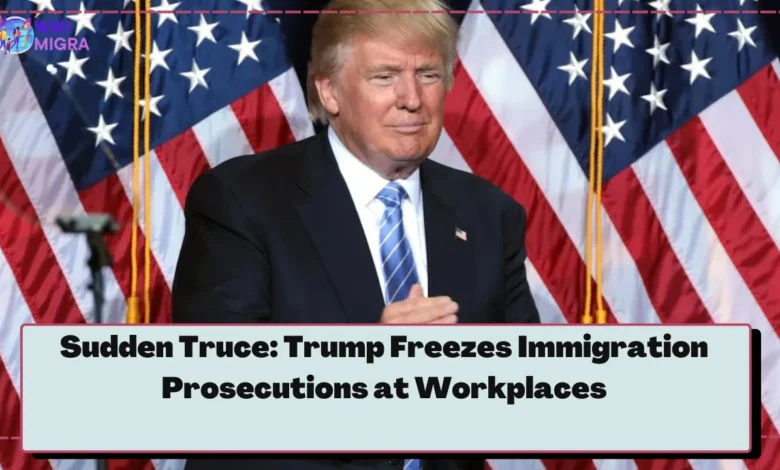Sudden Truce: Trump Freezes Immigration Prosecutions at Workplaces

The question concerns the current state of worksite immigration raids under the Trump administration, particularly in light of recent developments. To answer this comprehensively, we need to consider the initial pause, the industries affected, the implications for employers, and the broader context of immigration enforcement.
The industries explicitly mentioned in the pause are:
The Trump administration has ordered a pause on worksite immigration raids in specific sectors of the U.S. economy. This directive, communicated in an internal email from a senior ICE official, instructs agents to halt arrests of undocumented immigrants without criminal records in certain industries.
- Agriculture (farms, dairies, aquaculture)
- Hospitality (hotels, restaurants)
- Food processing (meatpacking plants)
This pause is a tactical move, not a permanent change in law, and can be reversed depending on political factors. Enforcement can still occur in homes, transit hubs, and industries not listed in the guidance.
The pause in worksite raids could ease pressure on businesses that rely on undocumented or mixed-status labor. It may reduce absenteeism driven by fear and help stabilize operations, offering temporary relief to industries dependent on immigrant workers. However, employers should remain cautious, as the situation is fluid.
Even with the pause, HR teams should take proactive steps to protect their workforce and ensure compliance. These steps include:
- Communicate Clearly and Carefully: Inform employees about the pause, but also clarify that other forms of immigration enforcement may continue. Offer updates in multiple languages and provide anonymous channels for questions.
- Audit Employment Practices: Review I-9 records, train managers on lawful hiring practices, and avoid discriminatory actions.
- Support Legal Pathways: Share information about immigration protections like DACA and TPS, and partner with legal aid groups.
- Revisit Emergency Protocols: Designate a point person for immigration-related inquiries and create a plan for ICE visits.
- Engage in Policy and Industry Advocacy: Join industry groups and track the impact of enforcement on the business.
The pause follows growing backlash from business leaders and rural lawmakers, who claim the raids are hurting industries that rely on immigrant labor. The move also comes after protests over workplace enforcement actions.
The Department of Homeland Security (DHS) has acknowledged the pause and stated that they will follow the president’s direction.
President Trump has stated that the aggressive immigration policy is taking away long-time workers from the agriculture and hotel industries, making it difficult to replace them. He has also indicated a willingness to exempt these industries from the immigration crackdown. However, this is a political crossroads, as Trump also promised mass deportations during his campaign.
- Construction Industry: While the pause is in effect for some industries, the construction industry has not been explicitly mentioned. The construction industry also employs a large number of immigrant workers.
- Economic Impact: The reliance on immigrant labor in key sectors means that any disruption can have significant economic consequences, including worker shortages and potential impacts on the supply of goods and services.
- Workplace Raids: Workplace raids have been a priority during Trump’s second term, and the recent increase in enforcement has created a chilling effect on businesses and workers.
The Trump administration has ordered a pause on worksite immigration raids in the agriculture, hospitality, and food processing industries, but this is a temporary measure, and employers should remain vigilant and proactive in their compliance efforts.





